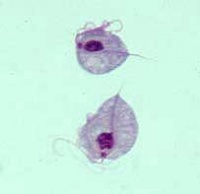| Tritrichomonas foetus | |
|---|---|
| Kingdom | Protista |
| Phylum | Protozoa |
| Family | Trichomonadidae |
| Genus | Tritrichomonas |
| Species | T. foetus and more |
Also known as: Trichomonas foetus —— Trichomonas fetus
Introduction
Tritirchomonas foetus are protozoal pathogens causing disease primarily in cattle and felids. They are identifiable by theiir pear-like shape, three anterior flagellae (recurrent flagellum) and an undulating membrane on one side.
Lifecycle and Transmission
Cattle
Tritrichomonas foetus is a venereal disease in cattle causing early embryonic death and abortion.
The protozoa resides on the surface and in the lumen of the female reproductive tract and in the crypt of penile epithelial cells. Transmission is achieved from infected individuals during mating and direct contact.
T. foetus has no known cyst stage, although carrier cows occur very rarely and the pathogenesis of th carrier state is unknown. Therefore, trophozoites replicate simply by binary fission. It is thought that T. foetus feeds from host lipids and fatty acids [1]
T. foetus is sometimes isolated from foetal gut and lung but this is unlikely to be due to invasion and more likely due to swallowing or inhalation of amniotic fluid in utero.
Cats
Tritrichomonas foetus is transmitted via the faecal: oral route in cats. Behaviours such as grooming may aid transmission by direct contact. The venereal route is unproven in cats.
Other Tritrichomonas spp.
Others such as Trichomonas suis and Trichomonas vaginalis reside as commensals, usually in the gastrointestinal tract of other species such as pigs and guinea pigs respectively. Trichomonas gallinae occurs in birds.
Relevant Links: Trichomonosis - Cattle
==References==
- ↑ Beach DH, Holz GGJr, Singh BN, Lindmark DG, 1991. Phospholipid metabolism of cultured Trichomonas vaginalis and Tritrichomonas foetus. Molecular and Biochemical Parasitology, 44(1:97-108;19)
The Animal Health & Production Compendium, Tritrichomonas datasheet, accessed 02/06/2011 @ http://www.cabi.org/ahpc/
Feline Advisory Bureau, Tritrichomonas infection in cats, accessed 02/06/2011 @ http://www.fabcats.org/breeders/infosheets/tritrichomonas/
Wright, I.(2010) Tritrichomonas foetus: Jumping the Species Barrier, UK Vet, Vol 15, 1-3.
Test yourself with the Protozoa Flashcards
| This article has been peer reviewed but is awaiting expert review. If you would like to help with this, please see more information about expert reviewing. |
